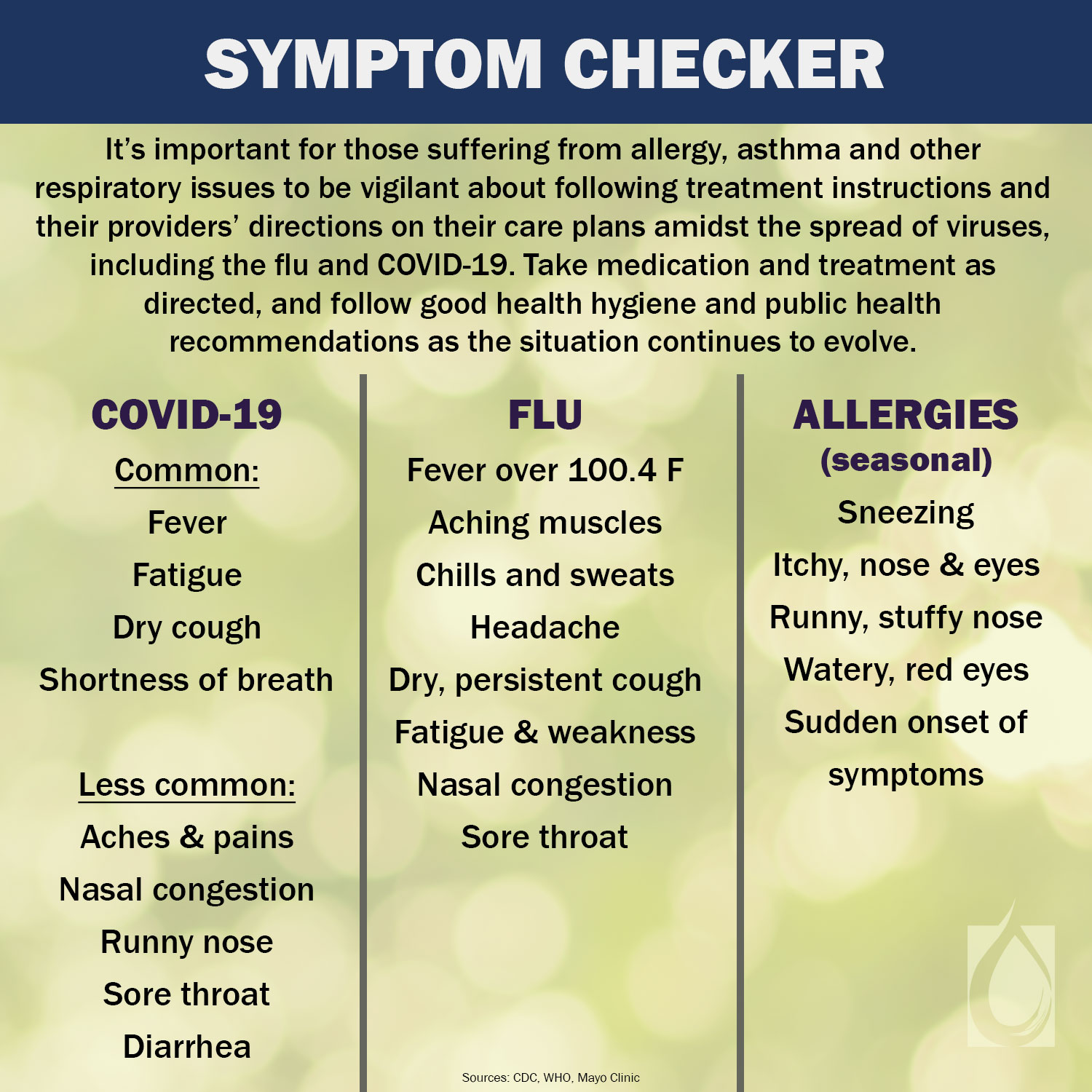Check Your Symptoms: COVID-19, Flu, and Allergies

During an uncertain time in our world with the spread of COVID-19 among other viruses, any sign of illness can be nerve wracking. If you’re feeling under the weather, this blog can help you understand the difference in symptoms between COVID-19, the flu, and allergies.
While resources like this can help you navigate uncertainty with your symptoms, it’s important to be in contact with your provider regarding your symptoms, unique health history and current treatment plans.
COVID-19
COVID-19, also known as the Coronavirus, is spreading rapidly around the world. While much information is still being gathered about this virus, there are a few symptoms that are most common, including:
- Fever
- Fatigue
- Dry cough
- Shortness of breath
According to the CDC, symptoms can appear two to 14 days after being exposed to the virus, but how people react to the virus can vary widely. While some may be asymptomatic after exposure, older individuals and those with underlying medical conditions may have more serious symptoms. Seek medical attention immediately if you experience:
- Difficulty breathing or shortness of breath
- Persistent pain or pressure in the chest
- New confusion
- Bluish lips or face
Be in contact with your provider to determine their recommendations about possible testing and treatment.
Respiratory Influenza (Flu)
The flu is still prevalent this time of year, and can manifest with symptoms similar to COVID-19. Here are flu symptoms to look for if you’re feeling under the weather:
- Fever
- Aching, fatigue, weakness
- Chills and sweats
- Headache
- Nasal congestion
- Sore throat
The CDC states that some may also experience vomiting and diarrhea – these symptoms being more common in children. Complications from the flu can include sinus and ear infections, as well as pneumonia. Consult your doctor if you’re having the above symptoms in order to receive a treatment plan that can minimize possible complications.
Seasonal Allergies
Spring allergies have just started to pick up – trees being the main cause of symptoms. Other year-round allergens like dust, animal dander, and mold can also cause irritation for many. The main differentiator for allergy is itching, which is not present with viruses. Other symptoms of allergy are:
- Sneezing
- Itchy nose and eyes
- Runny, stuffy nose
- Watery, red eyes
- Sudden onset of symptoms
Moderate seasonal allergy symptoms can typically be managed with over-the-counter antihistamines, though they don’t treat the cause, so symptoms will occur year after year. Allergy immunotherapy is a treatment option that retrains the body to not react to offending allergens. We advocate sublingual immunotherapy – or allergy drops – for a long term option for allergies.
Allergy and Asthma Insight During COVID-19
For those with allergies, asthma, and other respiratory issues, it’s critical to be vigilant about following treatment instructions and their providers’ directions on their care plans amidst the spread of viruses, including the flu and COVID-19. Both viruses can have a large impact on the respiratory system and can exacerbate otherwise controlled symptoms.
If you’re experiencing allergy symptoms and are interested in treating the cause with allergy drops, find a provider offering allergy drops following the La Crosse Method. Treating the cause of your allergies can also positively impact allergic asthma, which may help reduce exacerbations when exposed to viruses. With a heightened sense of awareness, now is a great time to consider what you can do to keep yourself in optimal health for years to come. Stay safe and healthy!




